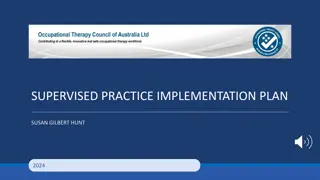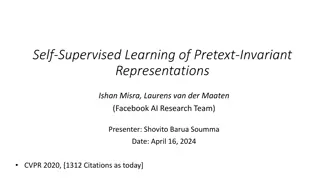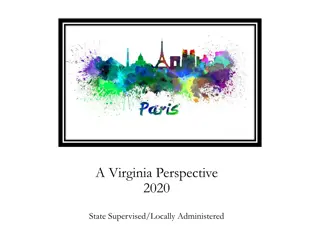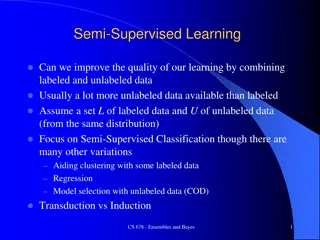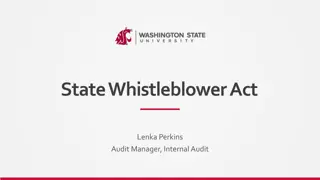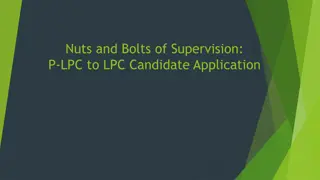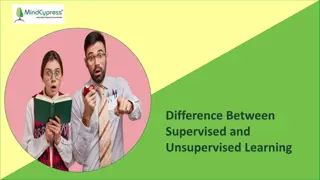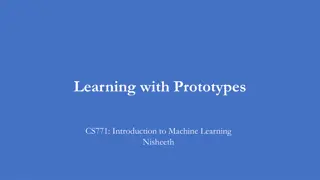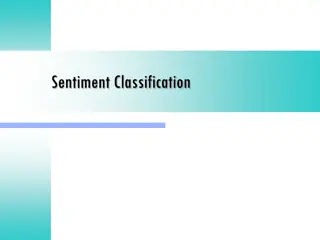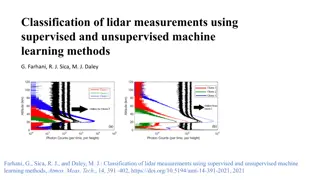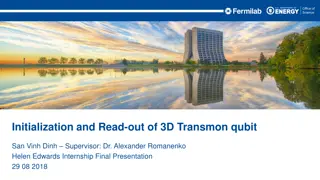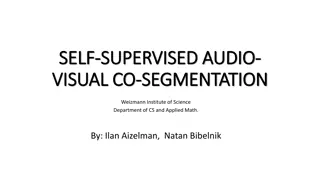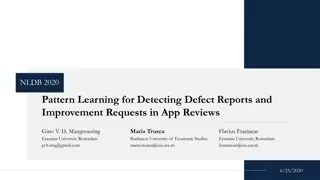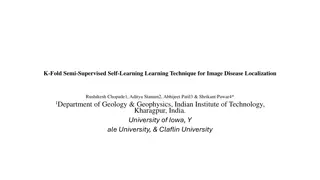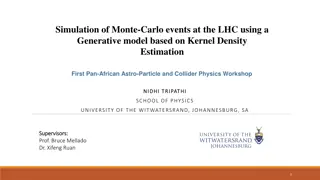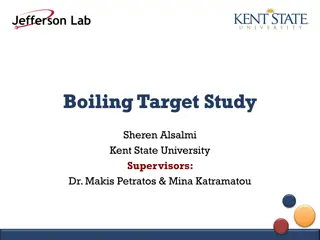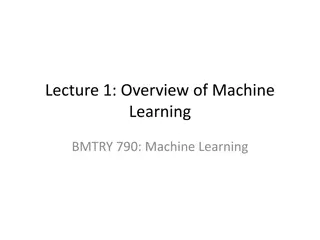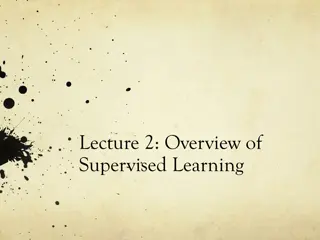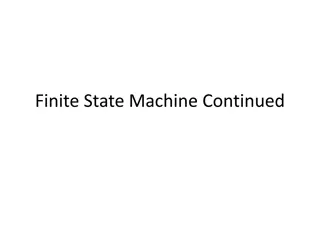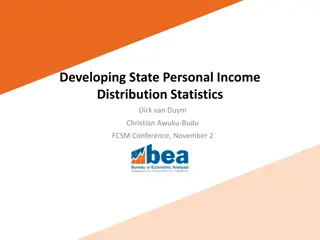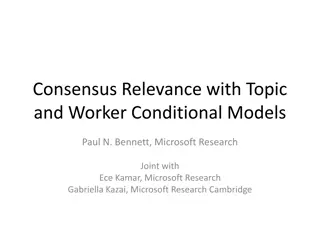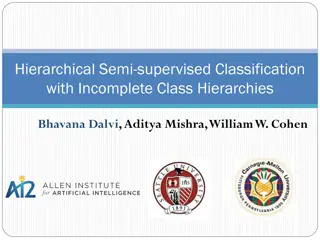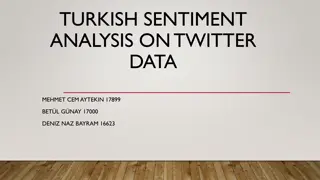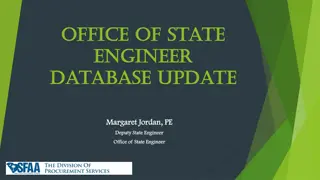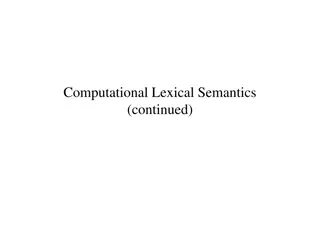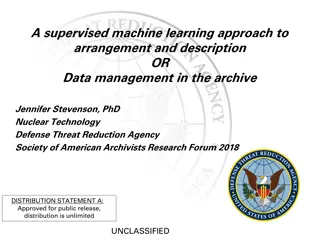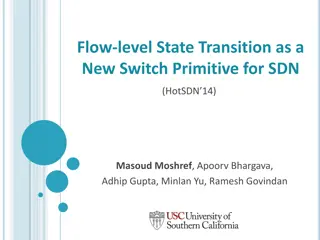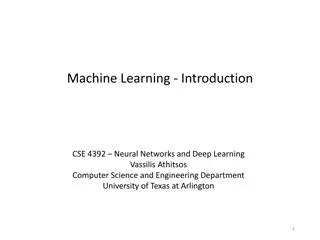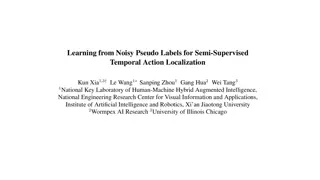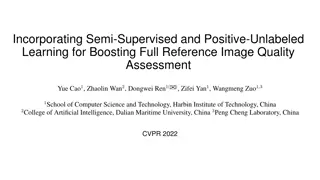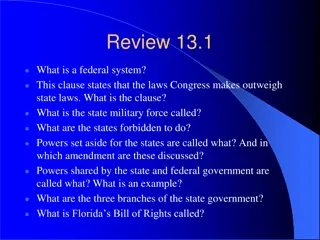Semi-Supervised Credit Card Fraud Detection via Attribute-Driven Graph Representation
Explore a novel approach for detecting credit card fraud using a semi-supervised attribute-driven graph representation. The technique leverages temporal aggregation and attention layers to automatically unify heterogeneous categorical attributes and detect fraudulent transactions without label leaka
1 views • 23 slides
Understanding Supervised Learning Algorithms and Model Evaluation
Multiple suites of supervised learning algorithms are available for modeling prediction systems using labeled training data for regression or classification tasks. Tuning features can significantly impact model results. The training-testing process involves fitting the model on a training dataset an
3 views • 74 slides
SUPERVISED PRACTICE IMPLEMENTATION PLAN
This presentation outlines the Supervised Practice Implementation Plan by Susan Gilbert-Hunt for occupational therapists. It covers the purpose, process overview, starting the process, and preparing for the SPIP. The plan includes finding a suitable workplace, developing effective actions, maintaini
0 views • 23 slides
Self-Supervised Learning of Pretext-Invariant Representations
This presentation discusses a novel approach in self-supervised learning (SSL) called Pretext-Invariant Representations Learning (PIRL). Traditional SSL methods yield covariant representations, but PIRL aims to learn invariant representations using pretext tasks that make representations similar for
0 views • 8 slides
Virginia Perspective 2020 State Supervised Eligibility Dashboard
The implementation of Virginia Perspective 2020, a state-supervised and locally-administered program, involves notifying staff through agency broadcasts and email alerts to detect fraud. Eligibility workers receive alerts through VaCMS Dashboard for PARIS matches, ensuring timely actions on case eli
0 views • 10 slides
Understanding Semi-Supervised Learning: Combining Labeled and Unlabeled Data
In semi-supervised learning, we aim to enhance learning quality by leveraging both labeled and unlabeled data, considering the abundance of unlabeled data. This approach, particularly focused on semi-supervised classification, involves making model assumptions such as data clustering, distribution r
1 views • 17 slides
The Historical Significance of the First Islamic State in Medina
The Islamic State in Medina established by Prophet Muhammad marked the beginning of a new era in Islamic history. It was the first welfare state, where divine teachings were implemented under his guidance. This state pioneered the integration of spiritual and temporal authorities, setting the founda
0 views • 60 slides
Importance of Supervised Driving for Learner Drivers
Learner drivers benefit greatly from supervised driving experiences as they help reduce crash risks, improve skills, and build confidence. The presence of a knowledgeable and authorized supervisor is crucial for enhancing road safety and developing competent drivers. This summarizes the key points d
0 views • 20 slides
Probate in Wyoming and Colorado: Essential Guide for Landmen
Probate is the legal process of transferring a deceased person's property to a living individual. Whether probate is necessary depends on how assets were owned at the time of death. In Wyoming and Colorado, probate proceedings vary based on different ownership structures. Establishing the death of a
5 views • 30 slides
Overview of State Whistleblower Act in Washington State
The State Whistleblower Act in Washington State, governed by the Revised Code of Washington (RCW) 42.40, provides a mechanism for state employees to report improper governmental actions. The Act aims to encourage whistleblowers to come forward, prohibits retaliation, and authorizes remedies for viol
0 views • 28 slides
A Comprehensive Guide to LPC Supervision and Application Process
Explore the nuts and bolts of supervising P-LPC to LPC candidates, including supervised experience requirements, documentation processes, submission guidelines, and application steps. Learn about reporting supervised hours, completing supervision documentation, and making recommendations for LPC can
0 views • 12 slides
Difference Between Supervised and Unsupervised Learning
If you want to learn more about supervised and unsupervised learning, you should enroll in a financial modeling training course online.
0 views • 10 slides
Introduction to Machine Learning Concepts
This text delves into various aspects of supervised learning in machine learning, covering topics such as building predictive models for email classification, spam detection, multi-class classification, regression, and more. It explains notation and conventions used in machine learning, emphasizing
1 views • 22 slides
Understanding Sentiment Classification Methods
Sentiment classification can be done through supervised or unsupervised methods. Unsupervised methods utilize lexical resources and heuristics, while supervised methods rely on labeled examples for training. VADER is a popular tool for sentiment analysis using curated lexicons and rules. The classif
7 views • 17 slides
Classification of Lidar Measurements Using Machine Learning Methods
This study focuses on classifying lidar measurements using supervised and unsupervised machine learning methods. By utilizing machine learning, specifically supervised learning, the researchers trained a prediction function to automatically label unlabeled lidar scans. They conducted steps to implem
0 views • 16 slides
Exploring 3D Transmon Qubits in Quantum Computing
This document delves into the initialization, read-out, and measurement techniques of 3D transmon qubits as integral components of quantum computing. It covers the underlying principles of superconducting qubits, SRF cavity utilization, and the roadmap for improving quantum memory and coherence time
0 views • 12 slides
Prison to Employment Strategy in Southern Border Region
This presentation focuses on the prison to employment strategy for the Southern Border Region, highlighting statistics on incarceration rates in California, specifically San Diego and Imperial Counties. It addresses recidivism rates, supervised populations, and measures of recidivism for state priso
2 views • 7 slides
Exploring Self-Supervised Audio-Visual Learning for Segmentation Tasks
Researchers from the Weizmann Institute of Science delve into the realm of self-supervised audio-visual learning for segmentation tasks, leveraging the correlation between visual and audio events to jointly train networks for enhanced understanding. Motivated by the potential of unsupervised learnin
0 views • 44 slides
NLDB 2020 Pattern Learning for Detecting Defect Reports and Improvement Requests
This research paper focuses on automatically learning patterns to detect actionable feedback in mobile app reviews, specifically identifying defect reports and improvement requests. The main goal is to develop a mechanism that can effectively classify feedback types using both manual and learned pat
0 views • 17 slides
Enhancing Image Disease Localization with K-Fold Semi-Supervised Self-Learning Technique
Utilizing a novel self-learning semi-supervised technique with k-fold iterative training for cardiomegaly localization from chest X-ray images showed significant improvement in validation loss and labeled dataset size. The model, based on a VGG-16 backbone, outperformed traditional methods, resultin
0 views • 5 slides
Machine Learning and Generative Models in Particle Physics Experiments
Explore the utilization of machine learning algorithms and generative models for accurate simulation in particle physics experiments. Understand the concepts of supervised, unsupervised, and semi-supervised learning, along with generative models like Variational Autoencoder and Gaussian Mixtures. Le
0 views • 15 slides
Analysis of Boiling Target Study at Kent State University
Boiling Target Study conducted at Kent State University focused on analyzing the impact of beam current on target density fluctuations, termed as Boiling. The study involved applying various cuts, calculating live time, and extracting charge yield data to determine the presence of target boiling. Su
0 views • 12 slides
Introduction to Machine Learning in BMTRY790 Course
The BMTRY790 course on Machine Learning covers a wide range of topics including supervised, unsupervised, and reinforcement learning. The course includes homework assignments, exams, and a real-world project to apply learned methods in developing prediction models. Machine learning involves making c
0 views • 62 slides
Overview of Supervised Learning in Regression and Classification
Dive into the fundamental concepts of supervised learning through regression and classification methods. Explore the differences between regression and classification, understand input vectors, terminology of variables, performance evaluation criteria, and optimal prediction procedures. Discover the
0 views • 45 slides
Understanding Finite State Machines in Digital Logic Design
Finite state machines play a crucial role in digital logic systems, allowing for the implementation of sequential circuit designs. These machines consist of states and transition functions, determining system behavior based on inputs and current state. The output function generates outputs based on
0 views • 35 slides
Developing State Personal Income Distribution Statistics
This project aims to create a distributional account for State Personal Income, allowing for the analysis of inequality by state and over time. Using various data sources such as BEA aggregates and IRS statistics, the distributional model provides insights into state-level income inequality. Census
0 views • 17 slides
Consensus Relevance with Topic and Worker Models
Study focuses on recovering actual relevance of a topic-document pair using noisy predictions from multiple labelers. Various supervised, semi-supervised, and unsupervised approaches are explored. The goal is to obtain a more reliable signal from the crowd or benefit from scale through expert qualit
0 views • 15 slides
Hierarchical Semi-Supervised Classification with Incomplete Class Hierarchies
This research explores the challenges and solutions in semi-supervised entity classification within incomplete class hierarchies. It addresses issues related to food, animals, vegetables, mammals, reptiles, and fruits, presenting an optimized divide-and-conquer strategy. The goal is to achieve semi-
0 views • 18 slides
Implementing Turkish Sentiment Analysis on Twitter Data Using Semi-Supervised Learning
This project involved gathering a substantial amount of Twitter data for sentiment analysis, including 1717 negative and 687 positive tweets. The data labeling process was initially manual but later automated using a semi-supervised learning technique. A Naive Bayes Classifier was trained using a Ba
0 views • 17 slides
Efficient State Engineer Database System for Improved Transactions
Interactive database designed to streamline transactions between the Office of State Engineer (OSE) and agencies, enhancing efficiency, accessibility, and accountability. It offers a secure platform for agencies to submit forms and information digitally, minimizing paperwork. Agencies are granted us
0 views • 13 slides
Understanding State Aid Regulations in the EU Post-Brexit
State aid regulations play a crucial role in ensuring fair competition within the EU. Post-Brexit, the UK is likely to still be bound by these rules. State aid is defined as any form of aid granted by a Member State that distorts competition, posing challenges for trade between Member States. The EC
0 views • 18 slides
Understanding Word Sense Disambiguation in Computational Lexical Semantics
Word Sense Disambiguation (WSD) is a crucial task in Computational Lexical Semantics, aiming to determine the correct sense of a word in context from a fixed inventory of potential word senses. This process involves various techniques such as supervised machine learning, unsupervised methods, thesau
0 views • 67 slides
Supervised Machine Learning for Data Management in Archives
In this study by Jennifer Stevenson, a supervised machine learning approach is proposed for arrangement and description in archives, specifically focusing on the DTRIAC collection which contains a vast amount of historical documents related to nuclear technology. The aim is to expedite the catalogin
1 views • 15 slides
State Machine Abstraction for Dynamic Network Actions in SDN
State machines are proposed as a new switch primitive in Software-Defined Networking (SDN) to facilitate dynamic actions at switches. This approach eliminates the need for a priori knowledge, reduces delays, and enables local state-based policies such as stateful firewall, FTP monitoring, and large
0 views • 6 slides
Understanding Machine Learning: Types and Examples
Machine learning, as defined by Tom M. Mitchell, involves computers learning and improving from experience with respect to specific tasks and performance measures. There are various types of machine learning, including supervised learning, unsupervised learning, and reinforcement learning. Supervise
0 views • 40 slides
Handling Label Noise in Semi-Supervised Temporal Action Localization
The Abstract Semi-Supervised Temporal Action Localization (SS-TAL) framework aims to enhance the generalization capability of action detectors using large-scale unlabeled videos. Despite recent progress, a significant challenge persists due to noisy pseudo-labels hindering efficient learning from ab
0 views • 30 slides
Cutting-Edge AI and Computer Vision Projects Supervised by Prof. K.H. Wong
Delve into the fascinating world of deep neural network research, computer vision for Google Glasses, and computer music research in these exciting MSC projects supervised by Prof. K.H. Wong. Explore the possibilities of face recognition, speech recognition, text translation, tourist navigation, and
0 views • 5 slides
Boosting Image Quality Assessment through Semi-Supervised and Positive-Unlabeled Learning
Incorporating Semi-Supervised and Positive-Unlabeled Learning methods enhances full-reference image quality assessment using less expensive unlabeled data and exclusion of negative samples. The framework involves PU learning with CE and NE losses, as well as SSL with MSE loss for labeled data and ps
0 views • 13 slides
Overview of State Government and State Legislatures in Florida
A federal system is a political framework where power is divided between a central government and individual states. In this system, laws created by Congress take precedence over state laws. The supremacy clause enforces this hierarchy. States are prohibited from actions like declaring war or mintin
0 views • 12 slides
Understanding Supervised Agricultural Experience Programs (SAEPs) in Agriculture Education
Supervised Agricultural Experience Programs (SAEPs) are structured experiences outside of regular classes that provide hands-on learning in agriculture. SAEPs aim to offer diverse career exploration opportunities, skills development, and recognition for individual achievements. They come in differen
0 views • 11 slides


